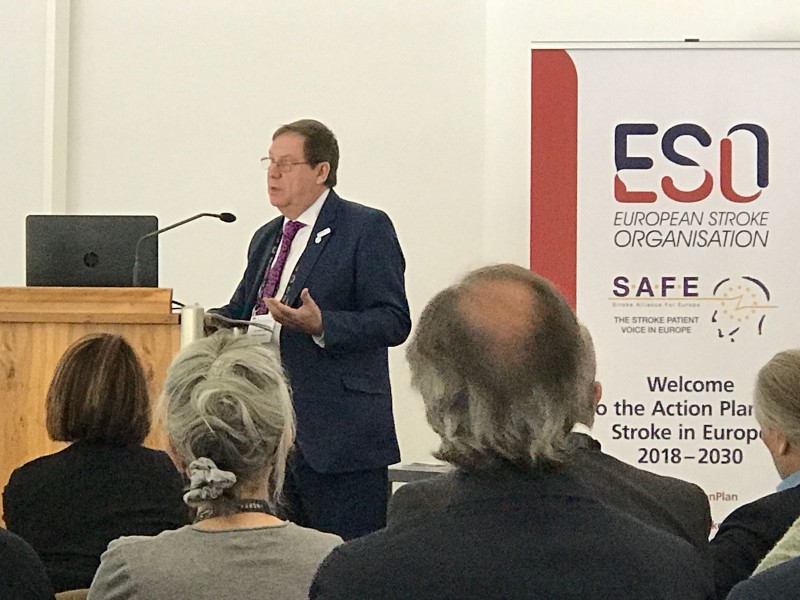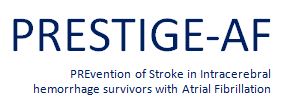
Mar 23, 2018
The Stroke Action Plan for Europe 2018 – 2030
A challenge for policy makers and a framework for tackling the rising burden of stroke in Europe
Leaders of the European stroke community met today in Munich to develop the ESO / SAFE Stroke Action Plan for Europe 2018-2030, including leading academics, stroke survivors and caregivers, doctors, nurses, physiotherapists, occupational therapists and representatives from stroke organisations and the World Health Organisation. It creates an aspirational framework to drive healthcare policy, research priorities, local stroke management and patient-focussed care to meet the need demonstrated in the ESO / SAFE Burden of Stroke report, with €45 billion direct and indirect healthcare costs each year, a 34% increase in strokes by the year 2035 due to the ageing population, and huge variations in the level of stroke care available across Europe. (more…)

Mar 19, 2018
A new multi-million Euro initiative funded by the European Commission has been set up to help prevent stroke in patients with existing conditions.
 The €6.9m project is aimed at patients with atrial fibrillation (AF), a common heart condition which causes irregular and abnormally fast heartbeat, who have previously had a stroke caused by bleeding in the brain (termed intracerebral haemorrhage or ICH). The Prevention of Stroke in intracerebral hemorrhage survivor with Atrial Fibrillation (PRESTIGE-AF) brings together scientists and clinicians across Europe with the goal of reducing the risk of further stroke in this group of patients. (more…)
The €6.9m project is aimed at patients with atrial fibrillation (AF), a common heart condition which causes irregular and abnormally fast heartbeat, who have previously had a stroke caused by bleeding in the brain (termed intracerebral haemorrhage or ICH). The Prevention of Stroke in intracerebral hemorrhage survivor with Atrial Fibrillation (PRESTIGE-AF) brings together scientists and clinicians across Europe with the goal of reducing the risk of further stroke in this group of patients. (more…)

Mar 13, 2018
Published first on ScienceDaily
A landmark international study of DNA samples from 520,000 individuals worldwide — including 67,000 affected individuals — identified 22 new genetic risk factors for stroke. Sudha Seshadri, M.D., of UT Health San Antonio, is senior co-author of this largest genetic study of stroke to date. Nature Genetics published the results online March 12 2018.
Previously, only 10 genetic risk factors had been identified for stroke.
Dr. Seshadri, founding director of the Glenn Biggs Institute for Alzheimer’s & Neurodegenerative Diseases at UT Health San Antonio and holder of the university’s Robert Barker Distinguished University Chair, said the identification of genetic regions that are strongly correlated to stroke will increase potential targets for stroke drug development. (more…)

Mar 13, 2018
Published first on ScienceDaily
A new study has found that people with dengue fever have a higher risk of stroke, especially in the first 2 months following infection. The study is published in CMAJ (Canadian Medical Association Journal).
“Clinicians in dengue-endemic areas should be aware of this association, especially for patients with dengue who have neurologic deficits or for patients with stroke who have unexplained fever,” writes Dr. Chia-Hung Kao, Department of Nuclear Medicine and PET Center, China Medical University Hospital, Taichung, Taiwan, with coauthors.
Dengue is a mosquito-borne viral infection that infects at least 100 million people every year around the world, with about 4 billion people at risk of the illness, which includes dengue hemorrhagic fever that can lead to spontaneous bleeding, organ failure and death. It is found in many countries in South and Southeast Asia, Africa, South America, the Caribbean, in the United States and more. (more…)

Mar 13, 2018
Published first on ScienceDaily
Doctors caring for severe stroke patients need to take account of their psychological needs and help prepare families for the possibility that they may not recover, a study suggests.
Patients and their families experience debilitating feelings of loss and uncertainty following a major stroke that impact on their quality of life, the findings show.
The results, from repeat interviews carried out over six months, also suggest that healthcare professionals should not shy away from sensitive discussions about death.
The study by the Universities of Edinburgh and Glasgow followed patients in Scotland over the course of a year following a severe form of stroke. Healthcare staff and family carers were also interviewed. (more…)







